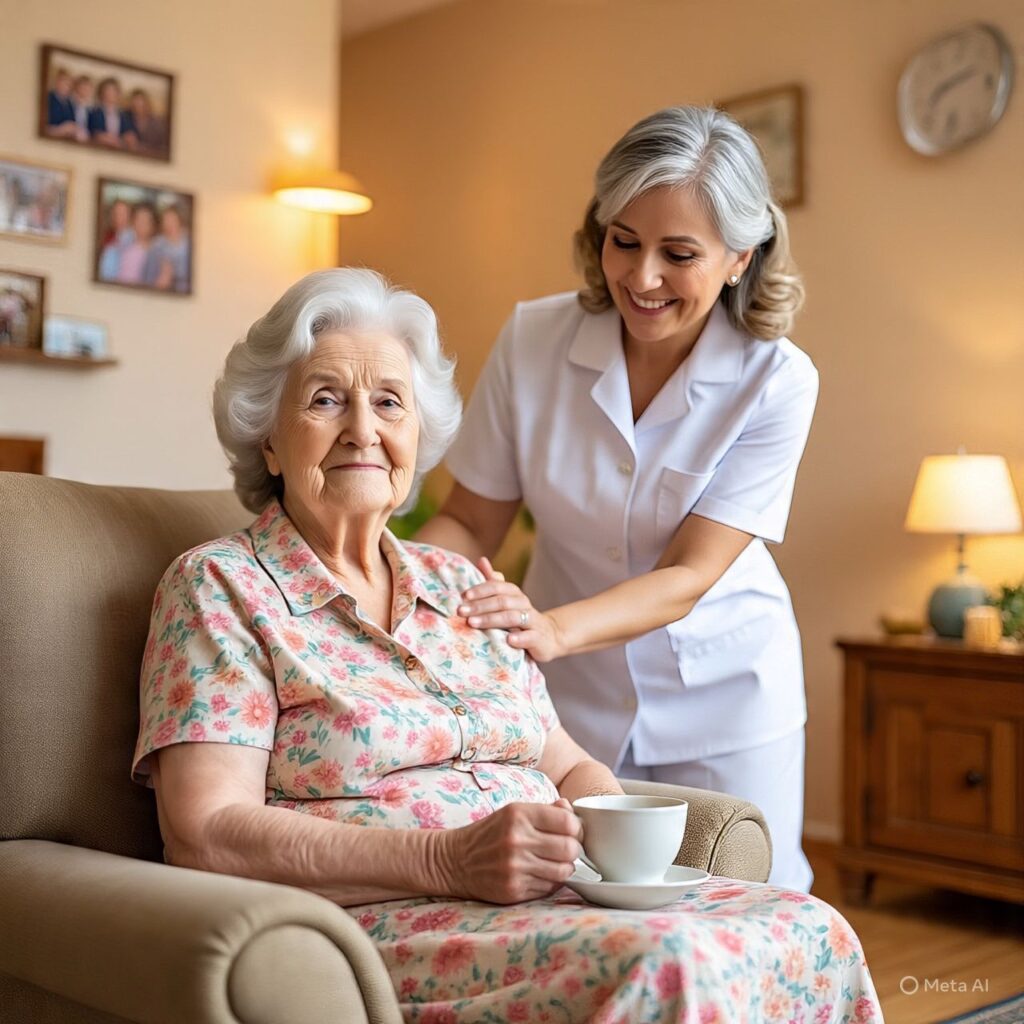Getting Older Doesn’t Mean Doing Everything Alone

Getting older can change a lot of things. Walking up stairs might take more time. Remembering to take medicine might get trickier. Even cooking meals or going to the store can feel tiring. But just because things get harder doesn’t mean someone has to give up being independent. That’s where support comes in. Getting help doesn’t mean someone can’t take care of themselves. It’s just a reminder that getting older doesn’t mean doing everything alone.
Why Seniors Sometimes Need Extra Support
As people age, their bodies and minds go through changes. Muscles may get weaker, joints may hurt, and eyesight might not be as sharp. Health issues like diabetes, arthritis, or memory problems can also make daily life more difficult.
This doesn’t happen to everyone in the same way, and not all at once. Some people stay active well into their 80s or 90s. Others might need help earlier. It depends on their health, their living situation, and whether they have friends or family nearby.
But here’s something important: needing help isn’t a failure. It’s normal. And it’s a smart move to get support before things become dangerous.
In cities like Philadelphia, some services focus on helping older adults live at home safely. Families looking for reliable care often check out options for senior support services in Philadelphia so they don’t have to figure everything out alone. Support like that can make daily life easier without taking away someone’s freedom.
How Support Services Actually Help
Support services don’t take over someone’s life. They help with the things that are too hard to do alone—things like bathing, cleaning, cooking, or remembering medication. This way, seniors can still live in their own home and keep their routines.
Some seniors only need help for an hour or two a day. Others might need more. Services can be adjusted based on what’s needed, which makes them useful.
Besides physical help, there’s also emotional support. Caregivers can be great listeners. They talk, play games, or even just sit and keep someone company. This matters more than people think. Being alone too often can lead to sadness or depression. Having someone to talk to makes life feel more normal.
Staying Safe While Living at Home

One of the biggest reasons seniors need help is safety. Falls are a huge risk as people get older. A small trip or slip can lead to serious injuries. Caregivers can make sure the home is safe—like moving rugs that cause tripping, or helping someone get in and out of the shower safely.
Caregivers also notice when something isn’t right. If a senior seems more confused, has trouble walking, or starts skipping meals, the caregiver can let family or doctors know. Catching problems early can stop them from getting worse.
Medication is another big thing. Many seniors take more than one kind of medicine, and it’s easy to forget a dose or mix them up. Support services help keep track of everything and make sure medications are taken the right way, at the right time.
It Helps Families, Too
It’s not just the seniors who benefit. Support services help their families a lot. Taking care of a loved one full-time can be really hard, especially if the caregiver also has school, work, or their own kids to take care of.
When a professional caregiver is there, families can take a break. They don’t have to worry every minute or feel guilty for not doing everything themselves. They can just enjoy time with their loved one, knowing someone trustworthy is helping out.
Support also keeps families from burning out. Being tired and stressed every day isn’t good for anyone. With help, everyone in the family feels better and less overwhelmed.
Getting Help Doesn’t Mean Losing Independence
One of the biggest fears older people have is losing their freedom. They don’t want to feel like a burden or be told what to do. That’s totally understandable.
But the truth is, getting help actually gives more independence—not less. When seniors get the help they need, they don’t have to rely as much on family or neighbors. They can do more of what they want to do, because they’re not struggling with the basics.
Being able to stay in their own home, on their schedule, is something most seniors want. Support services help make that possible.
Getting Older Doesn’t Mean Doing Everything Alone
How to Know When It’s Time to Get Help
Sometimes it’s obvious. Maybe someone fell, forgot to pay bills, or left the stove on. Other times, the signs are smaller. Maybe the house is messier than usual. Maybe meals are skipped or medicine isn’t being taken.
If someone seems lonely, tired, or more confused than usual, that might be a sign, too.
It’s okay to talk about these things. It’s better to bring it up early than to wait for something bad to happen. A gentle talk with family or a doctor can lead to the right kind of help.
In many cities, there are people you can call who will walk you through the options. You don’t have to figure it all out alone.
The Right Help Makes a Big Difference
Having support at home can change someone’s entire day. It can mean waking up feeling safe, eating healthy meals, taking medicine on time, and having someone to talk to. That might not sound huge, but it is.
Support services don’t try to take control. They try to help people live the life they want, with a little extra backup.
Whether it’s help with walking, reminders about appointments, or just a friendly face stopping by each day, it all adds up.
The Bottom Line
Getting older brings new challenges, but it doesn’t mean someone has to give up their independence. With the right kind of support, seniors can keep living at home, doing what they enjoy, and feeling safe while doing it.
Support services aren’t just about help—they’re about giving people their time, safety, and comfort back. Everyone needs help sometimes. What matters is knowing it’s okay to ask for it and knowing there are people out there who are ready to give it.
This blog post is part of ‘Blogaberry Dazzle’ hosted by Cindy D’Silva and Noor Anand Chawla in collaboration with Bohemian Bibliophile.










These services generally cost money but they can be a great gift for people whose work does not allow them to take care of their parents full time or when the elderly do not have anyone to take care of them and can pay for the services. Luckily I have seen some cities have NGOs and volunteers too that provide such support services for free.
It is so comforting to read that needing help as we age doesn’t diminish our independence, it actually enhances it.
Once upon a time, I would have wondered about this, but as my joints have begun creaking and walk gets slower, I really feel having a caretaker is useful. The need is to keep active and find help at the right time. For those, who get weaker, caregivers become a lifeline.
If you have good health and financial stability, growing older can be a phase of life that is enjoyable. Help is always beneficial, but learning to ask for it is essential.
I just read your post, what a comforting reminder. You’ve captured so honestly how growing older isn’t about going solo, but about rediscovering who walks beside us. Loved the warmth in your tone and the way you held space for vulnerability.
Nowadays, these help service agencies have become quite common. And it’s really important for a caretaker to be around, to function safely without losing independence.
Independence is a word the meaning of which varies from one person to another. Aging is not meaning losing independence… what I can see the independence level increased in case of my parents and in laws… pehla phir bhi kuch restrictions tha abhi to life bilkul bindass ha for both side parents.
Needing help is a natural thing, irrespective of age. It’s good to find caretakers who focus on providing physical as well as emotional support. We’re all going to go through this someday, better to have it from the comfort of our home.
Accepting that you need help is the first step. Though they do charge a bomb here I think if the need arises we will have to implement the plan of getting a help.
Such a powerful reminder — growing older doesn’t have to mean going it alone. It’s comforting to know support doesn’t stop independence, it just helps it thrive.
A very valid post, Harjeet. Not just seniors; anyone who needs help must ask. Having a father at home, I can relate to how seniors need help as they get older.
You explain aging and the need for support with sensitivity and clarity, highlighting both practical and emotional aspects.
I guess it’s very difficult to understand or live a lonely life in the final stage of life. Assisted living / retirement community is sometihng taking root in India as well. In Pune, some projects like Athashri where only senior citizens can have property with on campus doctor, common kitchen even every house has it’s own kithen if someone is too tired or not interested to cook someday!
A very important and helpful post.